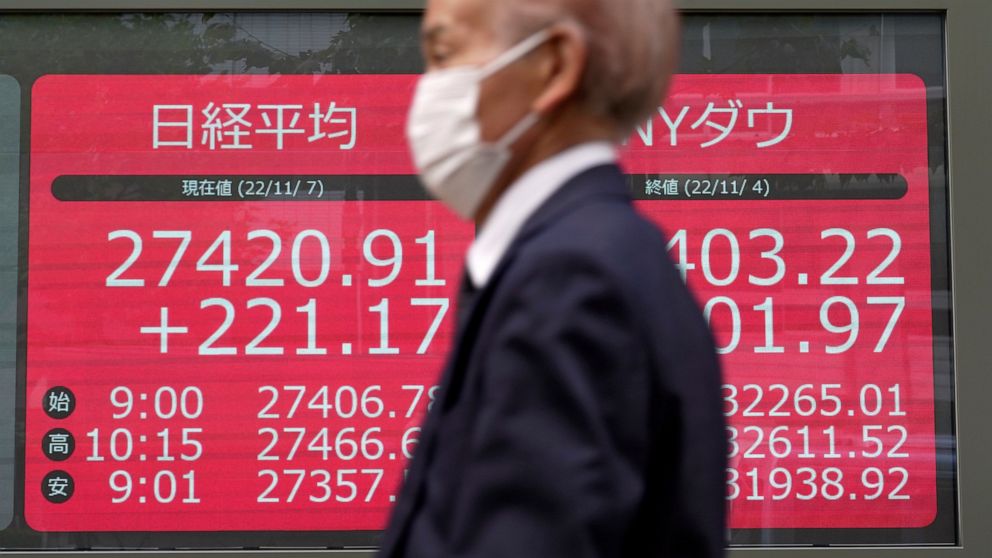Asian benchmarks advance as markets watch China, inflation

TOKYO — Asian stocks advanced Monday as investors weighed uncertainties such as the U.S. mid-term elections and China‘s possible moves to ease coronavirus restrictions.
Oil prices fell and U.S. futures edged lower.
China reported its trade shrank in October as global demand weakened and anti-virus controls weighed on domestic consumer spending. Exports declined 0.3% from a year earlier, down from September’s 5.7% growth, the customs agency reported Monday. Imports fell 0.7%, compared with the previous month’s 0.3% expansion.
Speculation about a possible relaxation of China’s zero-COVID strategy has had a huge impact on markets. On Monday, Hong Kong’s Hang Seng index gained 2.8% to 16,612.61 and the Shanghai Composite rose 0.2% to 3,077.85.
There has been no official confirmation in China of a major change.
“Over the weekend, Beijing has dashed hopes of China re-opening in the horizon, by reasserting of zero-COVID policies. And this could induce fresh caution,” Tan Boon Heng at Mizuho Bank in Singapore said in a report.
In the U.S., Tuesday’s election will decide control of Congress and key governorships. History suggests the party in power may suffer significant losses in the midterms, and decades-high inflation has become a significant issue for the Democrats.
Analysts say regional markets may take a wait-and-see approach ahead of the U.S. mid-term vote.
Japan’s benchmark Nikkei 225 jumped 1.2% to finish at 27,527.64. Australia’s S&P/ASX 200 gained 0.6% to 6,933.70. South Korea’s Kospi gained nearly 1.0% to 2,371.79.
Shares rose in Taiwan and but edged lower in India.
Wall Street stocks ended last week with a rally but only after yo-yoing several times. Market watchers had data on the U.S. jobs market to digest, considering what it might mean for interest rates and the odds of a recession.
The S&P 500 recorded its first weekly loss in the last three, despite Friday’s gain 1.4% to 3,770.55. The Dow rose 1.3% to 32,403.22, and the Nasdaq climbed 1.3% to 10,475.25. Both also finished with losses for the week.
The unemployment rate ticked higher in October, employers added fewer jobs than they had a month earlier and gains for workers’ wages slowed a touch. The slowdown was still more modest than economists expected. And so the Fed is expected to keep hiking rates.
Fed Chair Jerome Powell has called out a still-hot jobs market as one of the reasons the central bank may ultimately have to raise rates higher than earlier thought. Such moves could cause a recession.
The yield on the two-year Treasury fell to 4.68% from 4.72% late Thursday. The 10-year yield, which helps dictate rates for mortgages and other loans, edged higher to 4.16% from 4.15%.
In energy trading, benchmark U.S. crude fell $1.26 to $91.54 a barrel in electronic trading on the New York Mercantile Exchange. Brent crude, the international standard, lost $1.18 cents in London to $97.39 a barrel.
In currency trading, the U.S. dollar edged up to 147.29 Japanese yen from 146.92 yen. The euro rose to 99.43 cents from 99.15 cents.
———
Yuri Kageyama is on Twitter https://twitter.com/yurikageyama
[ad_2]
Share this news on your Fb,Twitter and Whatsapp
Times News Express:Latest News Headlines
Times News Express||Health||New York||USA News||Technology||World News